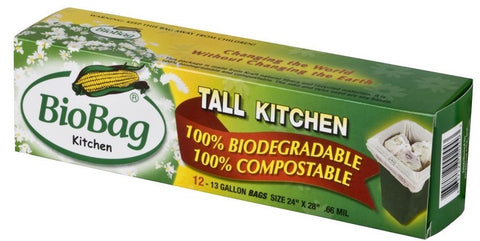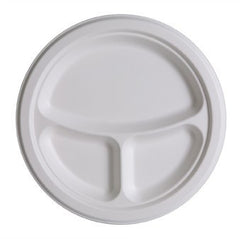- Continue Shopping
- Your Cart is Empty
Four Steps to Recycling and Composting at Your Thanksgiving Dinner

Want to have as little waste as possible when Thanksgiving Dinner comes to a close? Follow these simple steps and you'll minimize waste in a festive way!
1. Collect two old metal trashcans. You may have some around your house or you can usually find them at junk shops or online.
2. Spray paint the trash cans using a low VOC, nontoxic spray paint. Pick a festive Thanksgiving color like brown, gold or orange.
3. On the lids, use a nontoxic paint to write "Recyclables" on one and "Food and Paper" on the other.
4. Line the cans with a compostable, biodegradable garbage bag. You can head over to our sister store LeafyClean to check out our Bio Bags collection for product ideas.
5. Place them in the kitchen or another easy-to-access area.
Let guests know about your collection bins and then watch as they use them! At the end of the party, you'll have one bag ready for your composting pile or collection station and one for the recycling bins!

Tall Kitchen Bio Bags, 13 Gallons - 12 Bags per Box
Research Institute Uses Food and Paper Waste for Energy
A recent story published in The New Indian Express shows how organizations and institutions can use paper waste to reduce their costs. The Institute of Wood Science and Technology has implemented a plan to transform waste paper and food scraps into biogas on their campus.
The research institute studies forest health and timber applications, so paper conservation has always been a priority for the Bangalore-based organization. With the new plan, waste is collected in special bins on roughly 85 buildings on the campus. The food is then processed onsite into biogas and stored for later use.
With the gas, the Institute of Wood Science and Technology is able to produce enough fuel to power the appliances in the campus cafeteria. Yard waste collected by the maintenance facility is also processed for biogas. In the future, the institute may expand the scheme to include more waste, as currently only 10 percent of their kitchen waste is being turned into gas.

USDA Participating In Food Waste Challenge


This week the U.S. Department of Agriculture posted on their blog that the agency is in the midst of a Food Waste Challenge at their headquarters in Washington. The department is seeking to reduce the amount of waste that is thrown away in the cafeteria by 5 percent during this year.
The USDA is using some of the food scraps and paper waste collected in the cafeteria as composting for the People's Garden, a public garden located on the grounds of the building. The department professionally processes much of its own composting and stores some of the waste in drums to use as fertilizer.
In the blog post, the USDA urges homeowners to join the Food Waste Challenge by collecting their own compostable waste and starting a composting pile outside. If you'd like to participate, be sure to check out our Eco Products and Bambu compostable disposables, which are perfect for serving quick meals and are 100 percent compostable.
Penn State University Unveils New Waste Reduction Program
Kudos to Penn State University! This year, the public land grant college has instituted a new plan to dramatically reduce the amount of solid waste produced by the university that ends up in landfills.
Called Mobius, the program focuses on food waste. The university has set up special Mobius stations all over the campus for students, faculty and visitors to deposit compostable waste. The bins are found in all buildings that contain classrooms, dining halls and food courts and residence halls. They are also located in many of the athletic venues where the Nittany Lions hold home games.
Penn State will compost all of the waste and use it on campus. With the program, the university states that only 25 percent of the total amount of waste generated at the campus will need to be taken to landfills. That's a 10 percent decrease over the amount that is currently transported off of the campus.
We hope that other universities around the country will be inspired to follow Penn State's lead.

4 Tips for Composting in Your Kitchen
If you're concerned about the amount of waste produced in your kitchen, it's important to consider more than just how much paper that you throw away. Studies have found that 184 calories of food per person is wasted in the United States on a daily basis. This means that every day we throw away enough food to give every man, woman and child in the country a healthy snack.
Even if you shop smart and do what you can to not over purchase, food waste is unavoidable in the kitchen; however, you can be smarter about the way that you dispose of kitchen waste. Kitchen composting allows you to put your food waste to good use and can make landscaping more affordable.
Here are four kitchen composting tips to help you get started:
1. Choose a container. To make kitchen composting easy, you need the right container. The simplest solution is to purchase a ready-made kitchen composting bin, which is designed to control odors. You can also use a 5-gallon bucket with a lid; just be sure to line it with newspaper or sawdust to absorb odors. A final option is to fill a recycled plastic re-sealable bag with your composting and keep it in the refrigerator.
2. Prepare waste properly. Composting is more successful when food waste is properly prepared. Food scraps will break down more quickly when they are in smaller pieces, so mash, slice or chop up produce before adding it to your bin, bucket or basket.
3. Keep stirring! You'll want to stir, shake or swirl your composting container once per day. This helps to encourage the break down of foods.
4. Empty regularly. Letting kitchen composting linger for more than a week can lead to foul odors and even bacteria colonization, so set yourself up on a regular schedule for emptying your bin, bag or bucket.
Do you have any kitchen composting tips to share? Tell us about them in the "Comments" section.
Shocking New Environmental Report on Food Waste
While most of the time when we think of reducing waste in our kitchen our minds go to cutting back on plastic and paper waste, a new report from the Natural Resources Defense Council suggests that we should also be mindful of how much food we waste.
This alarming report explains that 40 percent of the food purchased in the United States is destined for landfills. Restaurants and grocery stores are big contributors to the problem of wasted food, but with 1 in 6 Americans suffering from hunger, it's unconscionable to not think about how much of the food that we buy ends up spoiling before we can eat it. Cutting back on your household's food waste is also good for the planet. While food waste is biodegradable, it does take up space in already crowded landfills.
Check out the infographic that the Natural Resources Defense Council put together showing Food Consumed versus Food Lost:

Here are some tips that you can use in your paperless kitchen to reduce wasted food in your home.
1. Don't grocery shop hungry. It's funny to think about, but true--when you go to the grocery store on an empty stomach, you often over-buy and end up with things that you simply can't use before they expire.
2. Freeze, freeze, freeze If you end up with extra ingredients when you finish up a recipe, package the rest and put it in the freezer for next time.
3. Check your produce. Make it a goal to check your produce once per day. When your fruits and veggies start to become too soft to eat raw, use them to make sauce, salsa, soup or jelly before it spoils. You can always can or freeze it to use another time.
4. Store your food properly. Keep eggs in their original cartons and store milk inside of your fridge, never on the door, to keep them from spoiling prematurely. Only store your produce in your refrigerator's crisper. Line the bottom of the cripser with a bamboo or soy disposable towel to absorb excess moisture and keep your produce fresher for longer.
5. Keep tabs on your fridge. Make sure your refrigerator is well-organized with plenty of space between foods to allow for proper air circulation. Never block the vents inside of your fridge with food.
Following these easy tips will help you dramatically cut down on wasted food in your home to protect the planet and save you money.






